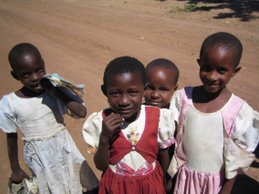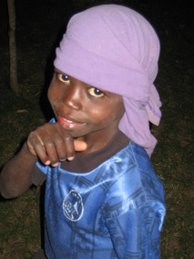The last few days
I'm back safe and sound in England.
So now that's three trips to Africa, no cases of malaria, no other strange tropical diseases or infections (except for the itchy bumps that look like mozzie bites), no muggings, no physical injuries that weren't self inflicted (accidently), no upset stomach, no other 'bad' things... the 'dark continent' is not nearly as dark as people fear.
There are a million thoughts and feelings swirling round my head about everything I've just learned and experienced, but writing about it is proving difficult. Here is a bit of my last days, I will try and coherently express more of what I'm feeling in the coming weeks...
My last week in Africa went really well. I managed to get quite a few interviews at the UN tribunal on my last two days in Arusha through befriending a really nice Nigerian lady - she helped me get my foot in the door more places than I would have on my own! Hearing different departments have completely different responses to my questions made me again question the effectiveness of UN operations, though I think the UN is a good idea, it just needs more legitimacy and (always) more money. For witness support, the UN gives the tribunal a mere $70 per witness per year for medical expenses. In the aftermath of the genocide, giving anti-retrovirals to witnesses is a moral (and logistical) necessity which costs the tribunal $240 per person per month. The massive shortfall is made up through additional fundraising efforts by the already over stretched staff.
Arusha is the launching point for the safari circuit and Mt Kili climbs, not a city you would go to for it's charm. Most travellers spend as little time in the place as possible, so when I returned the hotel staff were really happy to see me. One evening I went out to dinner with Max, a guy that works in the hotel. He had wanted to be a farmer but didn't have the capital, or the land, or the resources to do it and so has worked very hard doing whatever he can. For the past few years he has been working 24 hour shifts at the hotel, earning about $70 a month and spending about half of that on rent.
It seems most of the Tanzanian economy is supported through tourist $$$, yet time and time again I've seen that the more tourists hit an area the more prices are inflated. In Arusha the prices on just about everything are double that of Mwanza, a much larger town with (seemingly) more opportunities for employment but very few tourists. Although I recognise the need for tourism, I can't understand how people who live here manage to survive. The dinner I had that night cost roughly half of my companion's monthly disposable income.
Last Thursday I had a relatively easy bus ride from Arusha to Nairobi and spent the rest of the day becoming increasingly more paranoid as it seemed every shop I went into had an additional locked door and armed guard than the last one. After dark I stayed in the hotel, but feeling rather hungry and not wanting to venture out alone I gave a couple of Congolese men I'd met earlier a call and we went out for dinner. They'd told me some rather impressive stories about their families, which I thought had been rather exaggerated, but when they picked me up in a Jag I had to reconsider.
Nairobi was really cold and a tad frightening. Definitely much nicer than it's made out to be ('the most dangerous city in Africa') but at the same time, it's a bit spooky to be frisked before being able to enter the building where you are changing your flight ticket and walk through two (or more) bolted doors with armed guards to enter shops. I'm not really sure all the security is necessary, but perhaps all the money being spent on security would be better off spent on trying to alleviate poverty so you don't need all that security. The enduring impression I have of the city is that there is quite a lot of wealth (in many respects it seemed a lot like any Western city) and overwhelming poverty just outside. Nairobi has some of the largest slums in the world, instead of trying to help the slum-dwellers, it seems the government's policy is to push the slums back from the city centre and ignore them.
My last night in East Africa was spent with very little sleep. After returning from dinner I overheard the man next door refusing to pay the woman he'd just slept with. She was asking for 500KSh (about $7) for putting her life at risk. The hotel cost about $50 a night, so there's no way he couldn't afford it. My stomach churned as I heard her pleading for her kids and he shoved her out into the hallway. I spent the night thinking about the huge inequalities here: between rich and poor, between tourists and residents, between those that have and those that don't. It's no wonder HIV continues to spread amongst the vulnerable.







